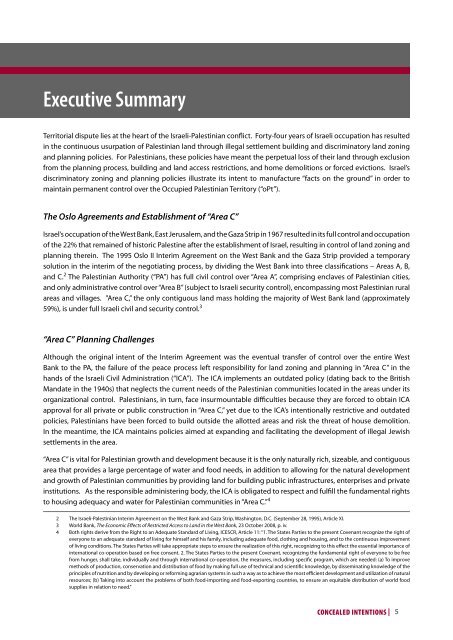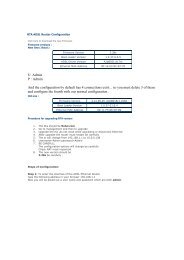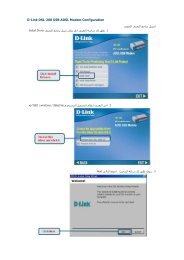Concealed Intentions- JLAC-.pdf
Concealed Intentions- JLAC-.pdf
Concealed Intentions- JLAC-.pdf
Create successful ePaper yourself
Turn your PDF publications into a flip-book with our unique Google optimized e-Paper software.
Executive Summary<br />
Territorial dispute lies at the heart of the Israeli-Palestinian conflict. Forty-four years of Israeli occupation has resulted<br />
in the continuous usurpation of Palestinian land through illegal settlement building and discriminatory land zoning<br />
and planning policies. For Palestinians, these policies have meant the perpetual loss of their land through exclusion<br />
from the planning process, building and land access restrictions, and home demolitions or forced evictions. Israel’s<br />
discriminatory zoning and planning policies illustrate its intent to manufacture “facts on the ground” in order to<br />
maintain permanent control over the Occupied Palestinian Territory (“oPt”).<br />
The Oslo Agreements and Establishment of “Area C”<br />
Israel’s occupation of the West Bank, East Jerusalem, and the Gaza Strip in 1967 resulted in its full control and occupation<br />
of the 22% that remained of historic Palestine after the establishment of Israel, resulting in control of land zoning and<br />
planning therein. The 1995 Oslo II Interim Agreement on the West Bank and the Gaza Strip provided a temporary<br />
solution in the interim of the negotiating process, by dividing the West Bank into three classifications – Areas A, B,<br />
and C. 2 The Palestinian Authority (“PA”) has full civil control over “Area A”, comprising enclaves of Palestinian cities,<br />
and only administrative control over “Area B” (subject to Israeli security control), encompassing most Palestinian rural<br />
areas and villages. ”Area C,” the only contiguous land mass holding the majority of West Bank land (approximately<br />
59%), is under full Israeli civil and security control. 3<br />
“Area C” Planning Challenges<br />
Although the original intent of the Interim Agreement was the eventual transfer of control over the entire West<br />
Bank to the PA, the failure of the peace process left responsibility for land zoning and planning in “Area C” in the<br />
hands of the Israeli Civil Administration (“ICA”). The ICA implements an outdated policy (dating back to the British<br />
Mandate in the 1940s) that neglects the current needs of the Palestinian communities located in the areas under its<br />
organizational control. Palestinians, in turn, face insurmountable difficulties because they are forced to obtain ICA<br />
approval for all private or public construction in “Area C,” yet due to the ICA’s intentionally restrictive and outdated<br />
policies, Palestinians have been forced to build outside the allotted areas and risk the threat of house demolition.<br />
In the meantime, the ICA maintains policies aimed at expanding and facilitating the development of illegal Jewish<br />
settlements in the area.<br />
“Area C” is vital for Palestinian growth and development because it is the only naturally rich, sizeable, and contiguous<br />
area that provides a large percentage of water and food needs, in addition to allowing for the natural development<br />
and growth of Palestinian communities by providing land for building public infrastructures, enterprises and private<br />
institutions. As the responsible administering body, the ICA is obligated to respect and fulfill the fundamental rights<br />
to housing adequacy and water for Palestinian communities in “Area C.” 4<br />
2 The Israeli-Palestinian Interim Agreement on the West Bank and Gaza Strip, Washington, D.C. (September 28, 1995), Article XI.<br />
3 World Bank, The Economic Effects of Restricted Access to Land in the West Bank, 23 October 2008, p. iv.<br />
4 Both rights derive from the Right to an Adequate Standard of Living, ICESCR, Article 11: “1. The States Parties to the present Covenant recognize the right of<br />
everyone to an adequate standard of living for himself and his family, including adequate food, clothing and housing, and to the continuous improvement<br />
of living conditions. The States Parties will take appropriate steps to ensure the realization of this right, recognizing to this effect the essential importance of<br />
international co-operation based on free consent. 2. The States Parties to the present Covenant, recognizing the fundamental right of everyone to be free<br />
from hunger, shall take, individually and through international co-operation, the measures, including specific program, which are needed: (a) To improve<br />
methods of production, conservation and distribution of food by making full use of technical and scientific knowledge, by disseminating knowledge of the<br />
principles of nutrition and by developing or reforming agrarian systems in such a way as to achieve the most efficient development and utilization of natural<br />
resources; (b) Taking into account the problems of both food-importing and food-exporting countries, to ensure an equitable distribution of world food<br />
supplies in relation to need.”<br />
5





